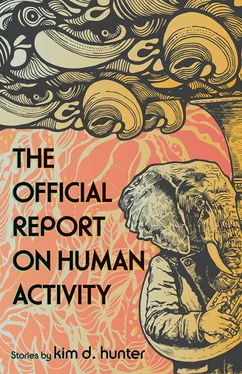The utter fear the Scientist felt at that moment reminded him of the fear that had led him to seek out the CEO in the first place. He needed to help his family. He felt his daughter slipping away and his wife being stuck into some unshapely hole of a career, and they would still have no good means of surviving, and he would be isolated at home with no colleagues, no work. So he began to edge slowly backward toward one of the ticket dispenser areas.
It wasn’t until he got home and was showing the lottery ticket to his family that it dawned on him he’d left the plastic bag with the surrogate behind. It came to him as he watched them watching a news gram about a “dead android” with eyes that appeared to want to crawl off of its face. Officials in the penal system thought the thing was a brilliant creation and were scrambling to find some uses for it and to find its creator, pretending, for some reason, that they hadn’t already scanned the object for its maker’s identity.
At that point, the news gram was interrupted by the CEO’s security detail appearing in the family’s house. Not grams but the real things, their muscles bulging through their orange lizard scale armor. Only one had a weapon. He’d also been modified with a spiked tail. They put the Scientist on an exclusive transport bound for the top office.
* * *
Though the people making the orders had no clear idea of what they would do with the units, orders for the dead android were pouring in from his friends who ran penal facilities, and the CEO wanted to be in on fulfilling the orders. The dead android was going be a goldmine, another platinum news gram for the collection. It was exciting because it was so crude and unexpected. The media in people’s implants all but throbbed as it consumed and resold the info.
Given all of this, the temptation was overwhelming for the CEO to listen in on his under partners’ conversations with the creator. Unbeknownst to even them, the CEO planned to summarily dump the Scientist after they’d made a good gram of him and he had revealed exactly where and how he’d stopped the printer to get the eyes just right. The CEO planned to give the Scientist a good chunk of money. But any demands for his fair share of the stream would fall on deaf ears.
What pushed the CEO to listen, albeit via external screen, and what distracted him from listening was the usual when he became overly excited—an earworm attack. He was, in fact, still a bit woozy from sleep aids and anti-hallucinogens taken the night before. But the sloshing sound and the familiar whisper of the voice that had no place, “What’s really in there?” and the mantralike repetition were all too recognizable and rising like foul water.
Deciding whether or not to listen in on the interrogation was as close as he ever came to questioning himself. He left the images flat on the screen but closed the audio, at least at first.
The CEO’s screen revealed what he’d gathered and feared, group after group of macho interrogators became drowsy, unwilling to admit that they could not listen to the Scientist without falling out. Finally, one woman interrogator fitted herself with a probe and began the interrogation via screen only. For a while there was silence as their exchanges appeared in front of them. The CEO opened the screen into a gram and with it came the audio, which was now only the room ambiance.
The woman was fascinated with the Scientist’s work on sharing consciousness without probes. He seemed on the verge of a monumental breakthrough if only he could get someone besides his wife and daughter to listen. With the mention of his wife and daughter, the aria from Tosca blossomed in his head. Some of the words made it to the screen in English and others in Italian. None of the music translated. The program seized up and men watching from behind glass all but pushed the woman aside and restarted the verbal interrogation.
Now, the temptation for the CEO to hear the infamous voice of the Scientist was too great. Just a snippet he thought, surely I could survive that. It took but a moment or two for the interrogators in the room to pass out, and the CEO fell asleep shortly thereafter.
When he awoke, he thought he was still dreaming. There was no trace of the earworm. He was almost frightened. He tried purposefully to recall the Bird’s sound. He brought it up and dismissed it with ease. He almost drafted parchment then and there that would grant the Scientist a fare share of the two streams, one for the dead surrogate and one for the earworm cure. Instead he closed all lines and became inexplicably absent.
When he returned, satiated from days of debauchery, he engaged the Scientist with a probe and cut a deal. The CEO would provide the Scientist access to his friends with the earworm, and he and the Scientist would split what the Scientist thought was an enormous fee. The Scientist agreed to it instantly. The walls of the room seemed to open as he all but leapt from his seat after his bios scanned through the parchment. He would return home triumphant. His family would not lose their home. His wife would not have to write those dreadful stories fit only for entertainment grams. His daughter would receive elite training.
What he didn’t know was that his daughter had left home after the second week of his absence. Security had prevented even the most basic communication with his family. Concern over the fate of the Scientist had left her and her mother distraught. The Author had tried to bury herself in her work. The Girl had taken to feeding the Bird more and more so that it would come more often. It became even chubbier and its song more robust. The Girl debated with herself. Was her hearing improving? Regardless, she loved the sound of the Bird. Her mother, on the other hand, did not. They tried not to argue. But it was no use. The link between the Bird and the Singer was unknown to the Author but was a beacon to the Girl, and, when things at home came to the breaking point, the Girl boarded a transport and sought out Nat and Tina.
The Scientist did not communicate with his family until he got home. Most of the joy he’d felt about his new position was lost with the Girl gone. The Author never thought she’d long to hear the disgusting, misshapen Bird. But she longed for any sign of the Girl.
* * *
It is hard to see your home until you leave it. The further the Girl got from home the clearer it became, especially in the moments that felt like gaps, spaces between intentions. It was there she found all the things she could have said and, just as importantly, recalled the true weight of idle moments. The Bird flew in the window and sat before it sang. Her mother had finished writing and stared out of the window. Her father closed his eyes with his ever placid face over a small hand screen of formulas. The three of them sat in a moment where no one spoke at the dinner table. One of them smiled a blank, reflexive smile and the others smiled back just as reflexively, and suddenly, because they came all at once, the smiles were not so blank.
Then there was the Bird. It refused to follow her. Assuming someone remembered to feed it, she would have to return home to see it.
The trip felt longer than it actually took and she fell asleep on the transport. Normally, this would not have been a problem, but the operators who were supposed to rouse sleepers before the end of the line were distracted by a gram, a rumor really, that a cure for the earworm had been discovered. They were all fascinated even after they admitted they didn’t know anyone with the worm.
The Girl wound up at the end of the transport line in the dark with barely enough money to get back to her destination. Even so, the transports wouldn’t cycle back up for hours. She was hungry and panicked. The operators that were supposed to have sent signals through the car to rouse her were now walking through the unit kicking people off, and they weren’t too kind about it. She jumped from her seat and began to grab her belongings to avoid being slammed around like some of the sleeping and disheveled folks in other parts of the car.
Читать дальше












